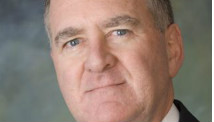By Roland Martin, CNN Contributor
February 16, 2013 -- Updated 1649 GMT (0049 HKT)
STORY HIGHLIGHTS
- Pope Benedict stuns world by announcing he will resign
- Roland Martin says it's a wise decision for a leader to step down when his powers fail
- He says a mark of a good leader is the care he takes about the institution he is leaving
- Martin: Too many in power try to hang on after they are no longer capable
Editor's note: Roland Martin is a syndicated columnist and author of "The First: President Barack Obama's Road to the White House." He is a commentator for the TV One cable network and host/managing editor of its Sunday morning news show, "Washington Watch with Roland Martin."
(CNN) -- When Thurgood Marshall retired from the U.S. Supreme Court in June 1991, a reporter asked him what were the medical reasons that contributed to his leaving the bench -- and its lifetime appointment -- after serving for nearly 25 years. He was his usual blunt self.
"What's wrong with me?" Marshall said at the packed news conference. "I'm old. I'm getting old and falling apart."
When the news broke this week that Pope Benedict XVI was stepping down as the spiritual leader of 1.2 billion Roman Catholics because of his concerns about being able to do the job, many began to speculate that there were other reasons for the decision.

Roland Martin
We have become accustomed to a pope dying in office. That's not a surprise. It has been nearly 600 years since the last pope, Gregory XII, quit in 1415.
Even though the job of pope is a lifetime appointment, frankly, it is selfish of any individual to hold on to the job for dear life, knowing full well they don't have the capacity to do the job.
"Strength of mind and body are necessary, strength which in the last few months has deteriorated in me to the extent that I have had to recognize my incapacity to adequately fulfill the ministry entrusted to me," according to a statement from Pope Benedict released by the Vatican.
Whether we want to be honest or not, it was sad to watch the decline of Pope John Paul II. He was a vibrant figure when he became pope in 1978, traveling the world and spreading the gospel to anyone who would listen. But toward the end of his life in 2005, he was barely able to move or talk, clearly worn down by significant health challenges.
Any leader who respects the organization they serve should have the common sense to know when it's time to say goodbye. We've seen countless examples of CEOs, pastors, politicians and others hang on and on to a position of power, hurting the very people they were elected or chosen to serve.
It takes considerable courage for anyone to step away from the power bestowed upon them by a position, as well as the trappings that come with it.
I'll leave it to others to try to figure out other reasons behind the resignation. But we should at least acknowledge the value of an ego-less decision that reflects humility and concern about the very institution the pope pledged his life to.
All leaders should be concerned about their institution continuing to grow and thrive once their days are no more. That's why a proper succession plan is vitally important.
Too often we have assessed great leaders by what they did in their positions. But their final legacy really is defined by how they left a place.
Pope Benedict XVI knows full well the Catholic Church cannot grow and prosper if its leader is limited in traveling and attending to his flock. There comes a time when one chapter must end and another begins. He has more days behind him than in front of him. He should enjoy his last years in peace and tranquility, without having to worry about trying to do the work designed for a younger man.
Follow us on Twitter @CNNOpinion.
Join us on Facebook/CNNOpinion.
The opinions expressed in this commentary are solely those of Roland S. Martin.
Part of complete coverage on
February 15, 2013 -- Updated 1512 GMT (2312 HKT)
This latest meteor over Russia shows how crucial it is that we keep our eye on the sky, says Colin Stuart.
February 16, 2013 -- Updated 0229 GMT (1029 HKT)
Tenisha Bell fled Chicago and won't go back. She lost her dad and two friends to gun violence there and doesn't want to lose her son, too.
February 15, 2013 -- Updated 1244 GMT (2044 HKT)
Parisa Safarzadeh and some friends boarded the cruise ship to celebrate their graduation; it turned into an ordeal.
February 15, 2013 -- Updated 1412 GMT (2212 HKT)
John Sutter says commenters made good points about the plight of the longterm unemployed.
February 16, 2013 -- Updated 1637 GMT (0037 HKT)
Frida Ghitis says the murder of Reeva Steenkamp allegedly by Oscar Pistorius is a reminder that we have to do more to protect women.
February 16, 2013 -- Updated 1520 GMT (2320 HKT)
He was the best player I ever saw, the most determined, the toughest mentally, the most confident, the least insecure, says David Aldridge.
February 14, 2013 -- Updated 2021 GMT (0421 HKT)
Jim Walker says there is an underside to those cheap cruises.
February 14, 2013 -- Updated 1332 GMT (2132 HKT)
Van Jones says we should not be giving an exalted place in our national discourse to the political rantings of a murderer.
February 14, 2013 -- Updated 1249 GMT (2049 HKT)
Andy Behar says not enough studies have adequately demonstrated the safety of nanoparticles used in some foods.
February 14, 2013 -- Updated 1741 GMT (0141 HKT)
David Gergen reveals the best, the worst and what was left out of President Obama's and Marco Rubio's addresses to the nation.
February 13, 2013 -- Updated 1629 GMT (0029 HKT)
After Barack Obama's speech and Marco Rubio's rebuttal, we should have heard from Kim Peters, who has been unemployed for more than a year, says John Sutter.
February 13, 2013 -- Updated 1848 GMT (0248 HKT)
CNN invited contributors to weigh in on President Obama's State of the Union address Tuesday night.
February 13, 2013 -- Updated 1859 GMT (0259 HKT)
Jessica Massa says today's romantic landscape is full of ambiguity and gray areas about where any given connection might lead.
February 12, 2013 -- Updated 2118 GMT (0518 HKT)
Peter Bergen says the interview with the bin Laden "shooter" adds important detail to the story of bin Laden's final minutes.

















